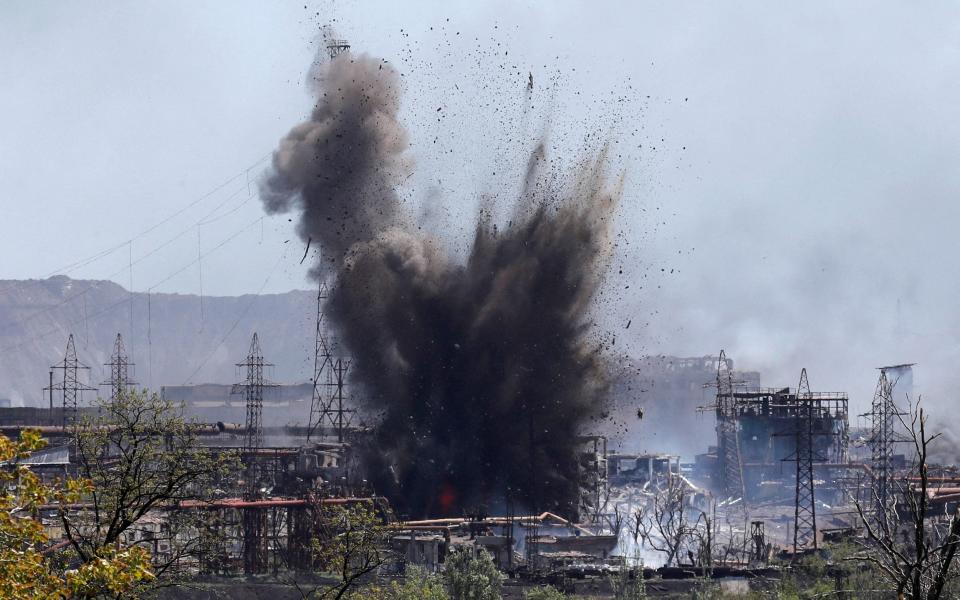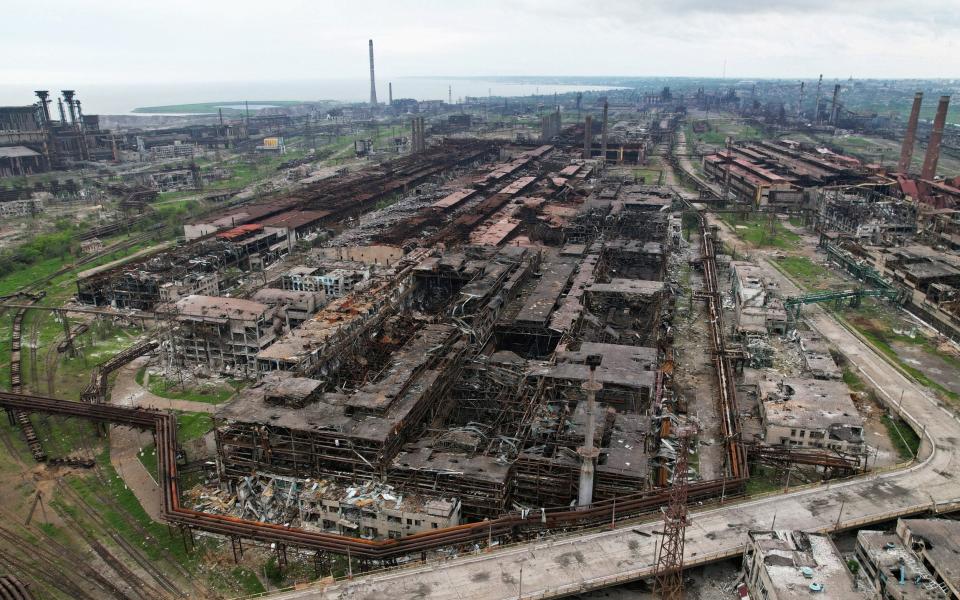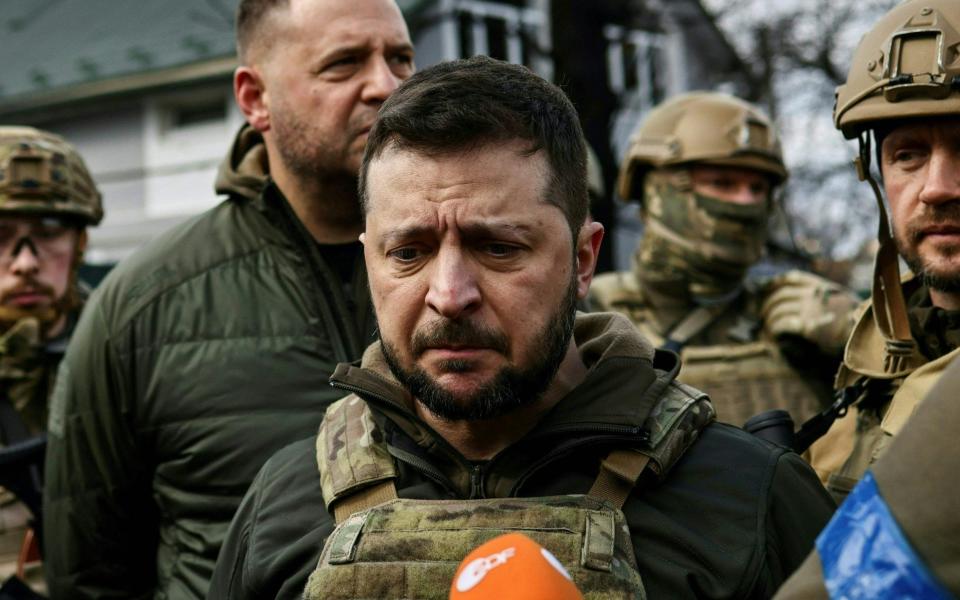‘We never expected the UK to be our closest ally’

The siege of vast Azovstal steelworks in the spring of 2022 marked the last stand of Ukrainian forces in Mariupol. Footage of brutal fighting over the port city, just 35 miles from the Russian border, invoked outrage as much as solidarity around the world for those doggedly defending it.
The struggle at the 80-year-old plant would become symbolic of the fighting spirit of Ukrainian citizens - many hiding in basements - and military alike, as Vladimir Putin’s forces unleashed a vicious campaign. Mariupol had held out for almost two months despite fierce bombardment by Russian forces ever since tanks rolled over the border in the early hours of 24 February.
Even when surrounded, Ukrainian military commanders ignored Russian demands to lay down their weapons in April. Instead, they and the thousands of civilians, retreated to the Azovstal, the four-square mile works that would be dubbed a “fortress within a city”. The defence would ultimately prove futile.
The situation remains surreal for Yuriy Ryzhenkov, chief executive of Metinvest, the Ukrainian steel and mining group that owns the Azovstal plant. Sitting in the Telegraph’s London office, Ryzhenkov recollects the moment Russia had invaded. On the evening of 23 February, the father-of-three took a call in his flat in Kyiv from a senior contact in the Mariupol territorial forces.
“He said that there is intelligence that Russian paratroopers are boarding planes and that the attack is scheduled for him the next day,” he says.
“And I told him: ‘Look, you’re crazy. They're still just raising the stakes.’”

With hindsight, the Russian invasion was well-signposted. Putin’s forces had been assembling on the country’s eastern border for months. But Ryzhenkov insists he had significant intelligence to suggest otherwise - the type of intelligence that multibillion-dollar companies pay big bucks for when operating in politically sensitive parts of the world.
“I told him: ‘Look, I'm going to call you at 4am and you are going to tell me that you are going to disembark the planes,” he says.
“So I set my alarm clock and called him.
“He said: ‘The planes that were scheduled to bring paratroopers into Mariopol from Russia, they are disembarking.’
“I said: ‘You see. I was right. It is all going to be fine’. And I went back to sleep.”
Just 20 minutes later, Ryzhenkov was woken up as rockets began hitting installations in Kyiv.
“We had our own assessment of the situation. And our assessment was that Russia was just raising the stakes,” he says, defensively.
“They [the Russians] didn't have enough supplies, they didn't have enough people and that's why we concluded they would not attack. We didn't believe that the invasion was going to happen, because there were not enough resources for a quick victory on the Russian side. And actually, we were right. They thought they were just going to march into Kyiv and everyone would just raise their hands and say, ‘welcome’.
“We in Ukraine, we knew that that was not going to happen. [But] we concluded wrongly that they would not attack.”
Oligarchy accusations

Metinvest is a collection of former Soviet industrial assets that fell into the hands of Rinat Akhmetov as the USSR collapsed. Since then the business has branched out to Italy, Bulgaria, the US and the UK, where it owns the Spartan steel plant in Gateshead.
Akhmetov is a controversial figure. Questions remain as to the genesis of his wealth. He has claimed it was built “trading coal and coke” as the Iron Curtain fell before spending his profits on “assets that no one wanted to buy”.
Ukraine’s richest person, Akhmetov’s net worth is estimated at $4.3bn, a far cry from his $15.4bn fortune in 2013. He has the trappings that might be expected of an Eastern European billionaire, owning the world's most expensive house, the $221m Villa Le Cedres - but has vowed to remain in Ukraine during the war.
Akhmetov also owns top Ukrainian football side Shakhtar Donetsk, and grabbed the headlines earlier this month by pledging to donate the £22m from the sale to Chelsea of star 22-year-old midfielder Mykhailo Mudryk towards a project named "Heart of Azovstal" which is aimed at "helping Mariupol defenders and the families of fallen soldiers".
The billionaire is not without his critics, however, having previously stood as a member of parliament for the ‘Party of Regions’ – a pro-Russian party that was dispersed following the Kremlin’s annexation of the Crimea in 2014.
And until recently the mogul had significant media assets. Media Group Ukraine controlled 11 television channels and publications such as Vogue Ukraine.
Akhmetov gave up his media interests in July after President Volodymyr Zelensky introduced new “anti-oligarch laws” that targeted those participating in political life; having an impact on the media; being the beneficiary of a monopoly; and having assets greater than $65m.
The laws were seen as something of a blunt instrument by some. “I have always been very sceptical about this law, as it simply personifies the problem instead of a systemic struggle with a disease like ‘oligarchy’,” said Sergey Fursa, an economic expert who works for Ukraine Dragon Capital, one of the country’s largest investment companies told the Institute for War & Peace Reporting.
Akhmetov was emphatic when relinquishing control of his media assets. “I was not, I am not and I will never be an oligarch,” he said.

Ryzhenkov, the man who Akhmetov entrusted with running the cornerstone of his empire, avoids directly addressing a question about Akhmetov's current relationship with Zelensky.
“We don't really have much relations with the president because he's more responsible for foreign policies or defence,” he says.
“We obviously work with the government as we have to do as a big business, as a big employer. We work with the Ministry for Economic Development, we've worked with the Ministry of Infrastructure.
“I think at the moment we have a very constructive, working relationship there. We understand that there could be likes and dislikes, but we are all working for the Ukrainian economy.”
He goes on to explain that Metinvest is “probably the biggest private supporter of the Ukrainian army” and has spent more than €100m helping the war effort.
He continues: “Rinat Akhmetov from the first day… he called me and said: ‘Look, whatever the costs are, we need to win. Go ahead.”
‘Whatever the costs are... we need to win’
Metinvest’s mills have begun manufacturing armoured steel for the first time. This has been used to produce 150,000 bullet-proof vests. It means one in every six vests worn by Ukrainian soldiers were made by Metinvest.
The list goes on. Some 1,000 drones, 1,500 terminal imaging aiming equipment and 25,000 special military helmets have been provided.
Whatever criticism still be levelled at Akhmetov, Putin’s bombardment of the tycoon’s assets in Mariupol suggests there is now no love lost between the two billionaires.
Ryzhenkov is yet to travel to Azovstal and the nearby Ilyich plant, which was given similar treatment by Russian forces. Such a safety-first attitude may surprise close friends given Ryzhenkov's favourite pastime is not football or the opera - but skydiving.
He does, however, have eyes on the ground. And despite images showing that the works have been flattened by bombing, the assets could be in a worse state.

“The pictures show big hits. But in reality, we know that they hit the decommissioned equipment, which was just due to be disassembled and removed.
“Some of the worst pictures,” he says, stifling an ironic chuckle, “were of the coke plant, which we decommissioned five years ago.”
“The rolling mills, they can be restored,” he adds. “We know that the Russians tried to restart it [two or three months ago]. They had people going out there to try and clean up the facilities there. And many people got blown up by mines.”
The situation in Mariupol unsurprising weighs heavily on Ryzhenkov.
“There were many people that stayed there with the defenders up until the last day in the bomb shelters. They would do literally anything with the defenders [until] the last moment.”
Prior to the Russian invasion, Metinvest had 35,000 of its roughly 100,000 employees working at the two sites in Mariupol. The group has tried to keep track of them - but the fate of many is unknown.
“We know about 20,000 to 25,000 of them have left the city. About half of them went to unoccupied Ukraine, half of them went through Crimea to Russia,” he explains.
“The rest, 10,000 to 15,000, we don't really know where they are. Presumably, they're still in the city.”
Meanwhile, at other sites, such as Metinvest’s coke plant in Ukrainian-controlled Avdiivka, just north of Donetsk, work is continuing despite being hit by Russian shells.
“We're trying to equip them [staff] with protective equipment like bulletproof vests, helmets and so on. But obviously, despite all of that you cannot avoid casualties.”

How does he feel about putting his staff in mortal danger? “Well,” he says, pausing. “It's very uneasy, to be honest. It’s always volunteers,” he adds. “People are very dedicated to the company. We have had family dynasties there since the 1930s. They feel like it's their own.
“It's actually more difficult to get them to hide in bomb shelters, or even to evacuate. Especially from some of the cities where there was a danger zone, like for example Avdiivka which is shelled on an hourly basis.
“We set up the facilities where we would be happy to move [employees] with their families, we would provide them with all the necessary help and so on. And people just refuse.”
‘Brussels sanctions are not working’
The West’s primary response to the war in Ukraine has been to impose sweeping financial sanctions on the Kremlin and Putin’s cronies. With Russia now a geopolitical pariah in the eyes of the West; Putin enjoys diplomatic relations with only a handful of major players on the world stage and is largely dependent on China for not being cut completely adrift.
But Ryzhenkov is far from gushing about the West’s decision to squeeze Russia and its supporters financially.
“Many sanctions have a delayed effect. Many sanctions start to hurt only a few months if not years later. So it's difficult to assess as of now the absolute efficiency or effectiveness,” he says.
Politically, Ukraine may well have designs on closer ties with the EU, but Ryzhenkov does not mince his words with respect to Brussels’ lax approach towards Russian steel imports.
“There are some sanctions that I think are not really working properly, like for example the sanctions for semi-finished steel products imports into Europe.
“There is a loophole,” he continues. “Well, it’s not a loophole. There is a quota for the Russians for the next two years for supply of semi-finished goods like steel without any restrictions.
“And that quota is pretty much equal to the average supply of Russian semi-finished products into the EU within the last five years. So basically, it doesn't even stop anything.”

The UK is not similarly guilty. This, however, could be a product of Metinvest being the country’s main buyer of steel slabs. “And obviously we are not buying Russian,” he adds.
“In Europe though, [there is demand for] lots of re-rolls. There are lots of companies that roll products from semi-finished to finished and they do import from Russia. The main countries that import are Belgium and Italy. We’re talking about millions of tonnes a year.”
The situation is frustrating, politically as well as financially, for Metinvest, Ryzhenkov explains.
“In essence, you punish producers which refuse to work with Russia because their competitors who don't refuse to work with Russia have a competitive advantage now.
“Because Russian… goods are cheaper. And because of that, you basically punish honest producers that refuse to buy from Russia. You are putting them at a competitive disadvantage here. And obviously that includes Metinvest, because we have the mill here in Newcastle [and] we also have two mills in Italy.”
Time again, Ryzhenkov has heard the justification on the Continent for member states being willing to continue lining the pockets of the Kremlin and the Russian war machine.
“I understand that the worries about the employment in certain parts [of the EU],” he says, citing claims that hundreds of jobs here and hundreds of jobs there will be lost because it is uneconomic to deal with more expensive non-Russian suppliers.
It’s a “manipulation” of the facts, he says.
“To me it's not a sincere comment, because we can buy from other sources. We didn't fire our people in the UK, we didn't fire our people in Italy, when we lost Azovstal and we had to buy slabs on the open market from [British Steel, Liberty Steel or Italy’s ADI].
“It's not like you have to stop the facility. In my view, [it seems like] there is a kind of lobbying there which stops those countries from banning Russian imports,” he adds.
‘We never expected the UK to be our closest ally’

Ryzhenkov is no stranger to the UK. Both his children study here and he proudly points out that much of the City of London skyline is constructed with Metinvest steel. Some 60pc of the steel used for the Shard, for example, comes from the company’s factories, he explains.
He travels to the UK roughly once a quarter to visit Metinvest’s Gateshead plant. Although a big football fan, retaining the company’s corporate box at Newcastle United’s St James’ Park has proved a savvy move to ensure clients are wined and dined – not to mention the Magpies’ riding high in the Premier League this season.
He studied in Britain, gaining an MBA from London Business School as back home the Orange Revolution raged in 2004 and 2005 - events that catapulted Ukraine into the British consciousness.
“That was the time that people in the UK found out what Ukraine is,” he said. “It's not Russia, it's actually something separate. It was an interesting discovery. And I had an opportunity to watch it [while living in Britain].”
Armed with his experience of living here, Ryzhenkov has still been taken aback by the UK’s response to the war in his homeland.
“We never expected this from the UK,” he says. “Somehow it didn't appear in our minds that the UK could be our closest ally.”
Boris Johnson may have grabbed the headlines as the first Western leader to visit Ukraine since the outbreak of war, but Ryzhenkov believes British politicians are being led rather than being leaders with regards to support for Ukraine.
He says: “They followed the mood of people. They felt that the UK society, the UK people, were supportive of Ukraine. They wanted to step in. And that's why the UK politicians stepped in.”
As the first anniversary of the war in Ukraine approaches Ryzhenkov is undecided on the country’s fate. Reality has struck in recent days as Russian forces captured the Ukrainian salt-mine town of Soledar, marking a rare piece of good news for supporters of the Kremlin's offensive.
And the downing of a helicopter with 14 people on board – including interior minister Denys Monastyrsky and his deputy – shines a light on the risks of remaining in Ukraine while publicly attacking Putin's military campaign.
He does, however, say that a return to the pre-February 2022 borders is not feasible. Ukraine would not be an investable country unless the Minsk Protocol that allowed the annexation of the Crimea is reversed.
“There is one [outcome] that we all want, which is that Ukraine is restored to its 1991 borders. Russia capitulates and agrees to pay reparations. And Ukraine joins Nato.
“That's the best case scenario, the ideal case scenario. The other scenario is that Ukraine stops fighting and basically gives in, then it's also investable,” he says, and laughs at the irony. “But only from the other side. But I don't think there are many of today's businesses which will stay in Ukraine, they will go out.
“Our shareholder said that he will never work under the Russian occupation.”
“And then there is a scenario for frozen conflict one way or another,” he says. In pure economic terms this could be the worst of all scenarios. “[Because] there isn't going to be any investment at all,” he explains.
“We had this Minsk [Protocol], which allegedly stopped the war in 2014. And in a way we believed them. Because we've invested a lot in Mariupol. We invested billions of dollars during the last eight years and now it's all been destroyed.
“[From now on] we will not believe any such things like the Minsk Protocol.”
Ever since the morning of Feb 24, Ryzhenkov does not know if things will ever be “fine” again.

 Yahoo Finance
Yahoo Finance 